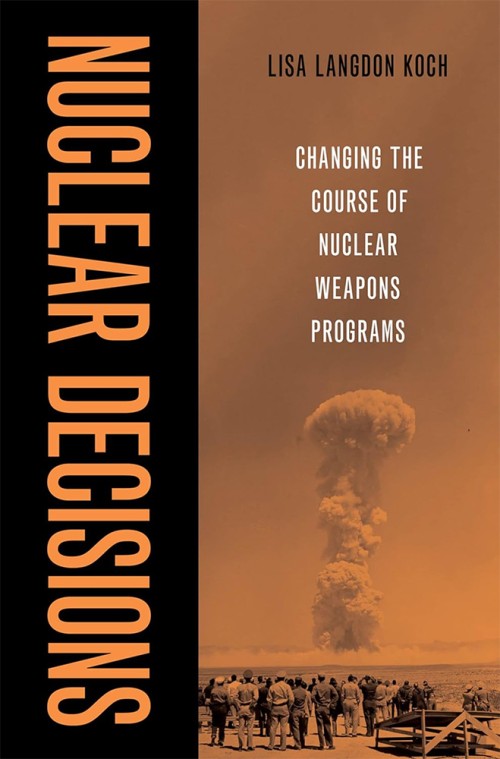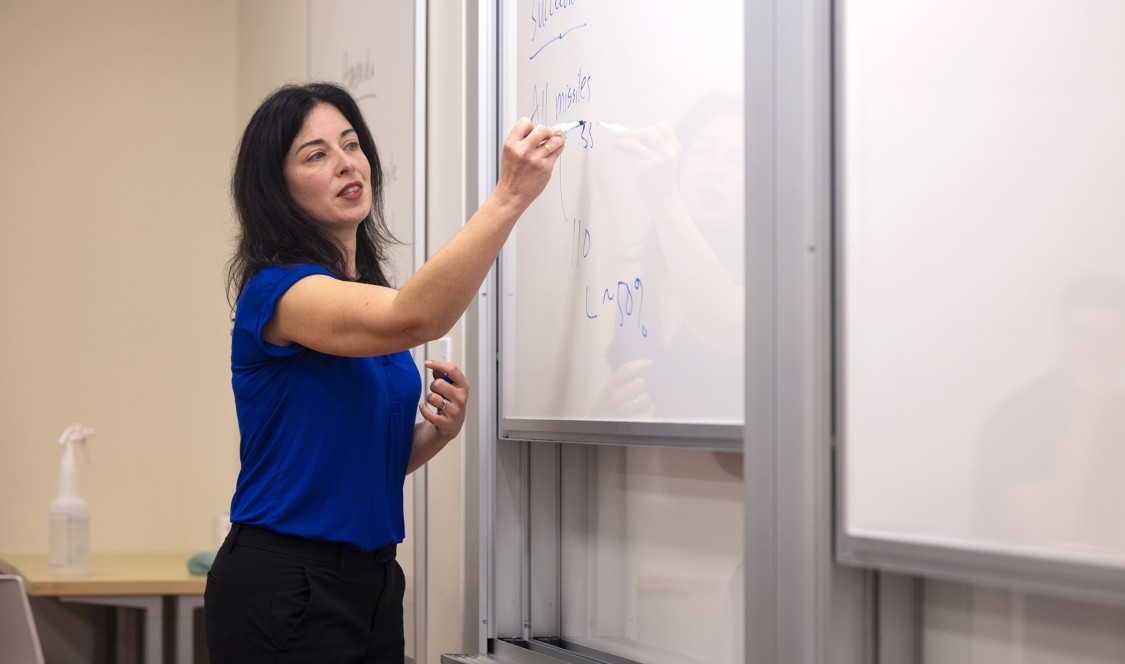Throughout her academic career, Professor Lisa Koch has focused on the consequences of nuclear weapons.
Yet, despite the literally apocalyptic topic, her work is infused with hope.
“When I’m researching and understanding nuclear weapons, teaching nuclear weapons, and writing about nuclear weapons, I always have an eye toward how we would want things to change and be different,” she said.
Her first book, Nuclear Decisions: Changing the Course of Nuclear Weapons Programs, which published in 2023, is the culmination of a long-term research agenda concerned with “international security and policy and decision-making” and focused on nuclear weapons, as she investigates, “Why do states take such different paths to and away from nuclear weapons? What slows the spread of nuclear weapons?”
In the book, Koch identifies mechanisms that shape leaders’ understandings of the costs and benefits of their nuclear pursuits. To accomplish this, she defines and discusses three different time periods across the atomic age when international political and structural conditions constrained — or freed — states to pursue nuclear weapons development.
A prolific author of scholarly articles and essays, Koch is a 2021 Stanton Foundation Nuclear Security Grant Program winner, and her work has also been funded by the Carnegie Corporation of New York.

Koch recalled that she began working on the project that became her book while she was in graduate school at the University of Michigan “because I thought that there was a gap in literature that I could address. Unfortunately, for years now, this has been a consistently timely topic.”
She estimates her interest in international relations sparked at age 12. “I liked reading about it, or listening to the news — I just thought it was fascinating, the whole big world and how these different countries interacted with each other,” Koch said. “I was always drawn to international security topics when I would read the newspaper in the morning because they felt to me to be the most urgent — life and death issues of war and peace. And, although I am interested in a lot of different topics related to security, nuclear weapons stood out for me as the biggest threat to human security. And because of the strategic aspect of nuclear weapons, and how they affect international politics, I just found that to be really challenging and fascinating to think about.”
Pursuing those interests, Koch earned a Ph.D. in Political Science and Master of Public Policy from the University of Michigan, and her B.A. from Boston College, where she was selected for a prestigious Harry S. Truman Scholarship.
Established as the living memorial to former U.S. President Harry S. Truman, and a national monument to public service, the Truman Scholarship made possible an internship at the State Department, where Koch worked in the Office of Regional Security and Arms Transfers. The opportunity provided her not only with an insider’s perspective on arms transfers, but also on the transfer of power.
“It was the summer of 2001,” Koch recalled. “There was a new presidential administration — the George W. Bush administration — and a new secretary of state, Colin Powell, and I got to see what happens when a new administration transitions in with new appointees, and how all of that works.”
Now Koch pays the experience forward, mentoring students, including Pieter van Wingerden ’24, who are interested in pursuing the Truman Scholarship.
Last year, van Wingerden was notified that he was named a Truman Scholar, as he sat in Koch’s classroom. She was ecstatic. “It was such a privilege to be able to be there during that process, and to welcome Pieter into that community,” she said.
Koch joined the CMC faculty in 2016, where, in addition to mentoring Truman Scholars, Koch serves as the Faculty Advisor for the College’s Alexander Hamilton Society. Beloved by her students, in 2023 she was selected to receive the Glenn R. Huntoon Award for Superior Teaching from the student body.
One student nominator shared: “She is one of the kindest professors I have ever met, and is extremely generous with her time, resources, and knowledge. She is a role model for all women pursuing careers in male-dominated fields.”
This spring semester, Koch is teaching a Government course on foreign policy and a seminar on “International Politics of Nuclear Weapons.”
“I want to empower my students to understand these things and be informed citizens. Some of them will work in government and some of them won’t,” she said, noting that her classrooms are full of students who are from all over the world. “I think it’s important for people to have a grasp of what these things are, what they can do, and how they shape politics.”
CMC students are up for the challenge, Koch said. “I treasure their intellectual curiosity and desire to learn, and apply what they are learning to shape their community, city, state, country, and world. I think our students just have that spark and drive in them …,which I think makes us special.”

